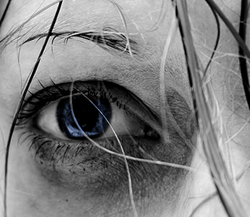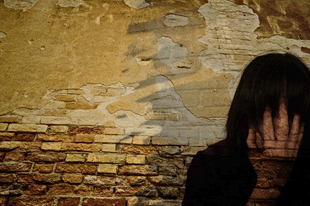Helpful Resources
Schizophrenics Anonymous
(313) 477-1983
National Suicide Prevention Line
1-800-273-TALK (8255)
National Hopeline Network
1-800-SUICIDE (1-800-784-2433)
"Live as if your were to die tomorrow. Learn as if you were to live forever. You must learn to be still in the midst of activity and be vibrantly alive in repose."
--Gandhi
What Is Schizophrenia? Symptoms and Signs
Schizophrenia affects over 25 million people worldwide, according to the World Health Organization.

Schizophrenia is a severe brain disorder where people have difficulty distinguishing reality from unreal experiences.
Schizophrenia may cause hallucinations, delusions as well as disordered thought patterns and actions. Without treatment, the ability of individuals with schizophrenia to function independently deteriorates over time.
Heredity, early environment, and social events appear to be important causal factors. Abuse of recreational and prescription drugs are known to worsen symptoms.
Schizophrenia Symptoms
The symptoms of schizophrenia can be attributed to other related conditions, and not one symptom alone is sufficient to make a diagnosis.
Schizophrenia symptoms usually start in the teens or 20s in men. In women, they start in the 20s or 30s. It's unusual for children to be diagnosed with schizophrenia and uncommon for anyone over the age of 40 or 50.
Symptoms are typically divided into four groups - positive, negative, cognitive and affective.
Positive Symptoms
In schizophrenia, positive symptoms refer to an exagerated distortion of normal functions. These excessive, unusual symptoms may include:
Delusions.
These are false beliefs that involve misinterpretation of real events or experiences. They are by far the most prevalent of schizophrenic symptoms.
Hallucinations.
- Schizophrenia is not a split-up personality or multiple personality disorder. Even though the name does imply a fractured personality, it pertains to a dysfunction of the normal balance of feelings and thinking. Source: Mayo Clinic
Thought Disorder.
Disorganized behavior.
Apathy
Flat affect: appearing to lack emotion
Decreased ability to process or execute routines
Poor hygiene
Social isolation
Loss of enthusiasm
Understanding incoming information
Focusing
Memory retention
Paranoid: Delusions of grandeur or persecution are almost always the central focus. Most of these people fear that others are interested in hurting them. Hallucinations (visual or auditory) are typically present.
Thought process and memory are not as impaired as in other types.
Disorganized: Also known as hebephrenic, disorganized schizophrenia is characterized by irrational thought processes, speech as well as innapropriate behavior. Unlike the paranoid subtype, hallucinations and delusions are not the most notable symptoms.
Catatonic: Catatonic schizophrenia consists of periods of extreme behavior that range from a coma-state for up to a month (catatonia), to periods of bizarre behavior and hyperactiveness. This subtype is rare these days due to improved medical treatment.
Undifferentiated: Patients in this category exhibit positive and negative symptoms but do not match the specific criteria for the other subtypes.
Residual: This subtype is used for patients who have experienced a minimum of one acute psychotic occurrence but currently don't have significant positive symptoms, such as delusions and hallucinations. They may exhibit negative symptoms, such as social isolation or lack of interest in daily activities.
In a study published on May, 22, 2013 in the peer-reviewed scientific journal Neuron, scientists succesfully reduced schizophrenia symptoms in mice by targetting the gene Neuregulin1, which is crucial for normal brain development.
The study genetically engineered mice so the Neureglin1 gene would mimic the high levels found in humans with schizophrenia. The results showed that during these elevated levels, mice exhibited odd behavior, appeared anxious and had difficulty with memory. These symptoms disappeared when the Neuregulin1 levels were returned to normal.
It is important to note that high levels of Neurgeulin1 exist only in a minority of people with schizophrenia.
In another study, a single four-hour treatment with the anti-hypertension medication sodium nitroprusside (known as Nitropress) dramatically improved symptoms of schizophrenia.
The results were published May 8th, 2013, in the medical journal JAMA Psychiatry.
The small study, led by researchers from the University of Alberta and a university teaching hospital in Brazil, involved 20 individuals with schizophrenia on regular anti-psychotic drugs. Out of this group, 10 were provided placebos. The other 10 participants were given small doses of sodium nitroprusside intravenously.
Patients on the anti-hypertension drug experienced a dramatic reduction of positive and negative symptoms of schizophrenia.
The improvements lasted for at least four weeks.
Social skills coaching - This centers on improving communication and socially acceptable interpersonal interactions.
Family therapy and support - Family and friends often require stress management coaching and understanding too. This approach offers help, support and education to family members coping with schizophrenia.
Psychotherapy - Cognitive-Behavioral psychotherapy is the treatment of choice for many clinicians, and found to be more efficient than other types of psychotherapy in treating schizophrenia. This approach, in adjunct with medication treatment and social skills training, can help people with schizophrenia manage their illness better and function more independently.
Behavioral skills training - This centers on improving social skills and independence. Some examples include but are not limited to: stress management training, communication skills training, assertiveness training, and daily living skills training.
Job coaching and placement - This works on helping people with schizophrenia find and retain jobs.
These symptoms involve seeing, hearing or even feeling things that are not there. Hearing voices is one of most common hallucinations in individuals with schizophrenia.
Did you know?
Difficulty communicating and forming thought processes can lead to breaking speech midsentence or arranging incomprehensible ideas, commonly known as "word salad."
This can present in many ways, from childlike silliness to erratic frustration.
Negative Symptoms
These symptoms are usually a diminishment or lack of qualities associated with normal behavior. They can surface years before positive symptoms occur. These symptoms consist of:
Cognitive Symptoms
Cognitive symptoms relate to difficulties with rational thinking.
These symptoms may very well be the most crippling in schizophrenia, given that they obstruct the capacity to carry out daily activities. People with schizophrenia may perhaps be born with these symptoms, but they may intensify once the condition starts. These symptoms include difficulties with the following:
Affective Symptoms
Schizophrenia also affects the state of mind, causing swift changes in moods. Additionally, individuals with schizophrenia frequently appear socially awkward, causing others to stay away from them, which results in social isolation.
Types of Schizophrenia
Schizophrenia Symptoms: Myths and Facts
Treatment
Medical treatment is the foundation of schizophrenia therapy. However, because medications that treat schizophrenia are known to have unwanted effects, individuals with schizophrenia are normally hesitant to take them.
Advertisement
Antipsychotics are the most frequently prescribed medications to manage schizophrenia.
They're considered to regulate symptoms by affecting the brain neurotransmitter dopamine and serotonin. Someone who is uncooperative might need to receive injections instead of oral treatment.
A person who is agitated may require to be calmed in the beginning with benzodiazapine such as lorazepam (Ativan).
New Medications
Newer medications are often the choice of treatment for many doctors given that they have less unwanted side effects than traditional medications.
Some of these include: Olanzapine (Zyprexa), Quetiapine (Seroquel), Risperidone (Risperdal), Ziprasidone (Geodon) and Aripiprazole (Abilify).
Traditional Medications
These antipsychotics are frequently more affordable than the newer alternatives, particularly the generic versions. However, these medications have recurrent and highly serious neurological effects, such as obesity and the likelihood of developing a movement disorder known as tardive dyskinesia.
These include: Haloperidol (Haldol), Chlorpromazine (Thorazine), Fluphenazine and Perphenazine.
Alternative Medicine
A new study publised in the journal JAMA Psychiatry found that adding folate and vitamin B12 supplements, along with conventional antibiotics, is effective in reducing symptoms of schizophrenia in a study of more than 100 patients.
The study focused on the negative symptoms of schizophrenia, which include social withdrawal, flat affect and apathy.
The effects were more significant in individuals carrying a gene involved with folate metabolism.
Latest Research
Helping someone with schizophrenia

People with schizophrenia generally don't realize that their challenges originate from a mental condition. Therefore the responsibility typically falls on friends or family for getting them support.
If you believe that a friend or acquaintance shows the signs of schizophrenia, consult with a physician, or mental health professional. Even though you cannot make someone seek professional help against their will, you can provide motivation and assist your close friend with finding a certified physician or mental health provider.
If your family member of friend is in a crisis, or a danger to himself/herself or others, seek immediate help. Thoughts of suicide are typical among individuals with schizophrenia. You may want to call law enforcement or other emergency services for help. Sometimes, crisis hospitalization may be required. Regulations on forced commitment for psychiatric treatment range by state. You can get in touch with a local mental health agency or police department for information.
Therapy and Support
Although antipsychotics are highly effective in reducing the symptoms of schizophrenia, they are seldom sufficient for long term recovery. Once the person is stabilized, psychosocial treatments are also important. These may include:
Online Citations
DSM-IV Diagnostic and Statistical Manual of Mental Disorders.
Schizophrenia: Comprehensive overview covers symptoms, causes, treatment and coping with this brain disorder. The Mayo-Clinic.
Schizophrenia: Information and Treatment Reviews some of the treatment options for schizophrenia. PsychologyInfo.
What Are the Symptoms of Schizophrenia? Describes symptoms, causes, and treatments. National Institute of Mental Health (NIMH).
Schizophrenia and Public Health Covers facts about the prevalence of schizophrenia around the world. World Health Organization.
Schizophrenia Symptoms and Types Information on schizophrenia symptoms, types and complications. WebMD.
Citations
American Psychiatric Association. Diagnostic and statistical manual of mental disorders, fourth edition. Washington, DC: American Psychiatric Association, 1994; 143-158.
Brunet-Gouet E, Decety J. Social brain dysfunctions in schizophrenia: a review of neuroimaging studies. Psychiatry Res. 2006;148(2–3):75–92.
Burns J. Dispelling a myth: developing world poverty, inequality, violence and social fragmentation are not good for outcome in schizophrenia. Afr J Psychiatry (Johannesbg). 2009;12(3):200–5
Dong-Min Yin, Yong-Jun Chen, Yi-Sheng Lu, Jonathan C. Bean, Anupama Sathyamurthy, Chengyong Shen, Xihui Liu, Thiri W. Lin, Clifford A. Smith, Wen-Cheng Xiong, Lin Mei. Reversal of Behavioral Deficits and Synaptic Dysfunction in Mice Overexpressing Neuregulin 1. Neuron, 2013; 78 (4): 644 DOI: 0.1016/j.neuron.2013.03.028
Georgia Regents Health System. "Schizophrenia symptoms eliminated in animal model." ScienceDaily, 22 May 2013. Web. 25 May 2013.
Hallack, J E C et al. Rapid Improvement of Acute Schizophrenia Symptoms After Intravenous Sodium NitroprussideJAMA. 2013;():1-9. 10.1001/jamapsychiatry.2013.1292. Accessed May 18, 2013.
Roffman J L et al. Randomized Multicenter Investigation of Folate Plus Vitamin B12 Supplementation in Schizophrenia. JAMA. 2013;70(5):481-489: 10.1001/jamapsychiatry.2013.900. Accessed May 10, 2013.
Updated: May 25, 2013
Article created: April 22, 2010
BACK TO TOP
![]() This site complies with the HONcode standard for trustworthy health information:
This site complies with the HONcode standard for trustworthy health information:
verify here.
Copyright © 2013 Psychology One. All rights reserved. This site is for education & information purposes. This site is not a substitute for professional psychological, medical or psychiatric treatment.